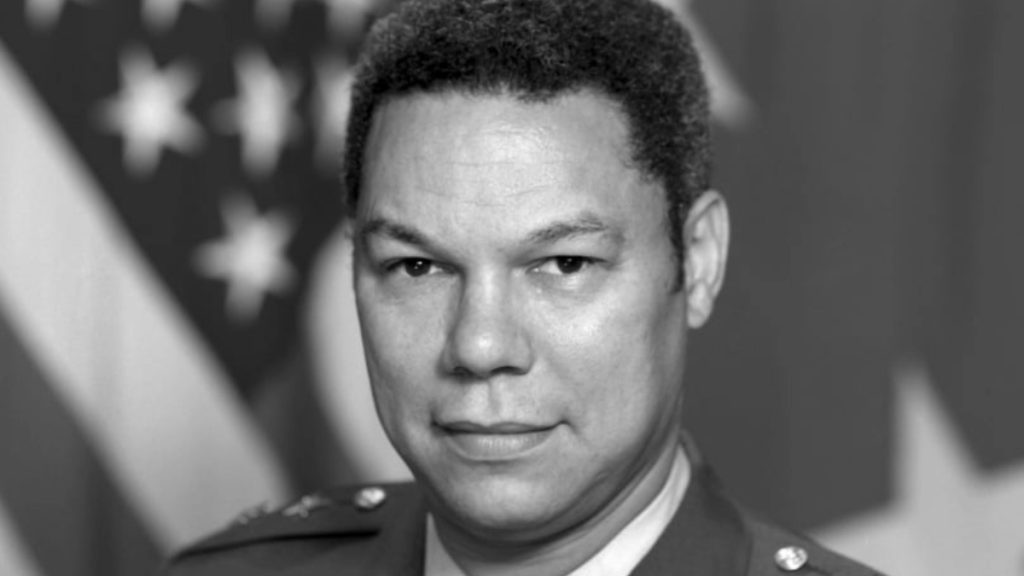When America honors its veterans, few figures embody both the soldierly tradition and the difficult responsibilities of leadership quite like General Colin Powell. He wasn’t perfect. He made decisions that haunt many. But his journey—from the immigrant son, to combat leader, to Secretary of State—offers lessons about duty, humility, integrity, and the real cost of freedom.
Humble Origins, Strong Foundations
Powell was born in 1937 in Harlem, New York, to Jamaican immigrant parents. His father, Luther Powell, worked as a shipping clerk; his mother, Maud, was a seamstress.
Raised in the South Bronx, Powell attended public schools; during high school, he worked at a baby goods store. It was there he learned Yiddish from the shop’s Jewish owners, and he later said one owner encouraged him with words of possibility—that he had more potential than he might imagine. Those small formative moments shaped Powell’s belief in service, respect, and paying forward opportunity.
While in college at City College of New York, Powell joined ROTC. It was that decision, not an early ambition for a high rank, that set his path. He graduated in 1958 with a degree in geology. He later said grading was mediocre—but what mattered more was what he learned through acting, risk, and leadership.
The Soldier: Vietnam, Risk, Doing the Hard Things
Powell served two combat tours in Vietnam. First, early in the 1960s, as a young lieutenant/advisor. He was wounded by a punji‐stick booby trap. Later, in his second tour in 1968-69, he had more responsibility and more risk. He survived a helicopter crash, then helped rescue comrades from burning wreckage, earning the Soldier’s Medal among other decorations.
These experiences left him wary of wars imagined from afar. He saw what happened when leadership, planning, or political clarity were lacking. He later developed what became known as the “Powell Doctrine”—that military force should be used only as a last resort, with a clear objective, with public support, and with an exit strategy.
Rising Through Command, Breaking Barriers
Powell was the first African American (with Afro-Caribbean roots) to hold several top roles: Chairman of the Joint Chiefs of Staff, then Secretary of State.
One interesting detail: as a young officer, he was once refused service in a Georgia restaurant because of his skin—reminder that even as he wore the uniform, many of his battles were against prejudice at home.
He had a strong reputation for being someone who listened to the people in the field. He believed in getting input from those closest to situations. Not only that, but he also emphasized accountability. His leadership style involved expecting excellence, but also being someone who treated people with respect.
The Diplomat & Policy Maker: Accomplishments and Shadows
Powell served as National Security Advisor, then Chairman of the Joint Chiefs, then, in 2001, became Secretary of State under George W. Bush. He was a key figure in the U.S. foreign policy architecture after 9/11.
One of the more controversial moments: in 2003 at the United Nations, Powell made the case that Iraq possessed weapons of mass destruction. That turned out to be wrong. He later called that speech a “blot” on his record.
Beyond that, Powell pushed for modernization of the State Department’s systems (communications, visa processes) and often argued for strengthening diplomacy and multilateral cooperation. He was also vocal about ensuring that foreign policy had an ethical grounding—not just strategy.
Lesser-Known Traits & Personal Life
- Powell loved cars. He repaired old Volvos, repainted, and resold them sometimes. This hobby wasn’t just mechanical—it grounded him, gave him perspective. He saw value in diagnosing problems in the small as well as the large.
- Despite his high office, he was known for humility: treating junior staff with respect; insisting on hearing from those closest to crises; and being approachable (rare in generals and cabinet members).
- The Powell’s (he and his wife Alma) invested in a service outside uniform: America’s Promise Alliance, helping youth and education, focusing on children who grow up with fewer resources so they might have opportunity.
- He kept ethical standards and tried to balance career ambition with moral accountability. He could be tough, decisive, even controversial—but he seemed deeply aware of the burden of command.
Legacy: What He Leaves for Veterans Day Reflection
Colin Powell’s life offers many lessons that go beyond leadership manuals:
- Moral clarity matters — Even when you don’t get everything right, the effort to interrogate intelligence, to press for truth, to accept responsibility, carries weight. Freedom is fragile when leaders misjudge or overpromise.
- Service is risk, but also sacrifice beyond the battlefield — Physical danger is real (as in Vietnam), but mental stress, ethical dilemmas, and public scrutiny persist long after.
- Leadership includes listening and lifting others — From input of junior officers to mentoring, investing in youth, Powell demonstrated that freedom is preserved not only by force but by building people.
- Duty without hubris — He held high office, but many stories show he assumed the weight of decisions seriously, even when unpopular or difficult.
- Legacy is complicated—and that’s okay — Because being a veteran means sometimes making decisions you later question, judging history along with your own conscience.
Remembering Powell on Veterans Day
On this Veterans Day, we hail Colin Powell not just for titles, medals, or speeches. We remember the immigrant roots, the patrols in Vietnam, the weight of command, the late nights reviewing intelligence, the ethical crossroads, and the humility amid power. A veteran’s life is rarely clean; it’s messy, costly, sometimes ambiguous—but it’s always vital.
Powell’s story reminds us that freedom is earned with sweat and verified by responsibility. It demands constant vigilance: in foreign policy, in how we treat one another, in ensuring opportunity, in acknowledging mistakes. Honoring him means supporting veterans, listening to their stories, making public service honorable again, and remembering that the power entrusted must be exercised with care.




